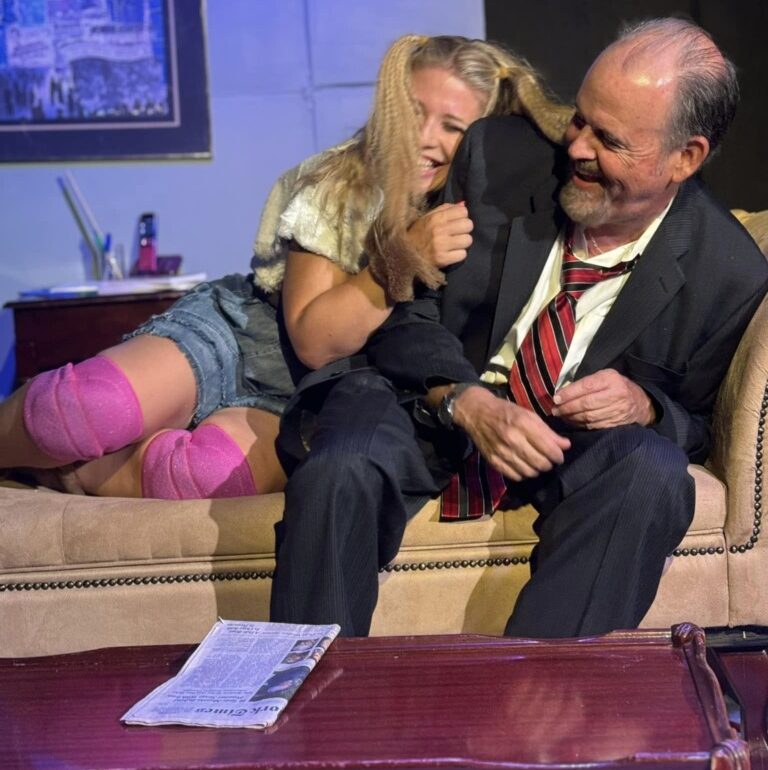author: Chris Pence
Ever wonder what your dog is thinking? How they feel about your love for them? How about how your love for your dog might impact your significant other? With A.R. Gurney’s Sylvia, Laurel Mill Playhouse examines all these questions and more, delving deep into the meaning of relationships, both human and animal.
Premiering off-Broadway in 1995, the play follows a stray dog named Sylvia as she is adopted by Greg, a businessman struggling with a midlife crisis. Things get ruff when Greg’s wife Kate doesn’t take to the dog and starts feeling that her relationship with Greg is being replaced with his relationship with his new dog. Sylvia opened on Broadway in 2015, and has featured such well-known names as Matthew Broderick, Blythe Danner, and Robert Sella, as well as Annaleigh Ashford and Rachel Dratch as the loveable scamp Sylvia. The play even includes reference to the premiere performer of the perky pooch (say that one three times fast!), Sarah Jessica Parker.
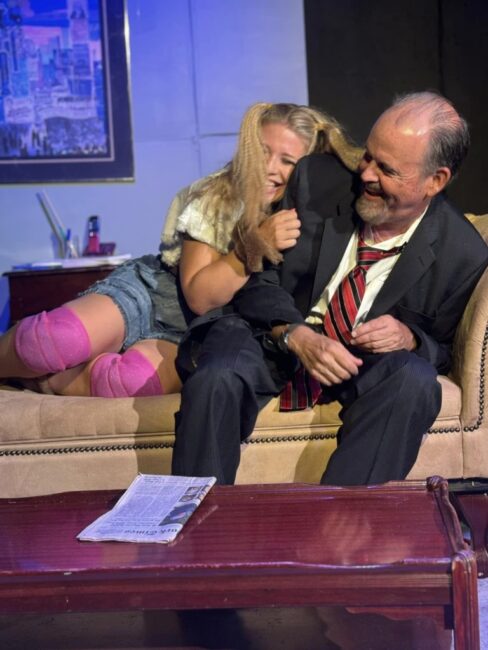
Producer Maureen Rogers and Director Ilene Chalmers bring the story of Sylvia to the Laurel Mill Playhouse with tact and understated personality. Nothing wild or flashy, just presenting the story as it is, leading to more realistic and relatable storytelling. David Chalmers handles the set, including set design, decoration, painting, and construction. Again, nothing over-the-top, just a simple, well-managed set with a few minor adjustments which help to switch scenes between the couple’s New York apartment, a bench in Central Park, an airport waiting area, and the therapist’s office. Stage Manager Lori Brunn and her team move the scenes quickly and efficiently, changing an apartment window showing the New York skyline into an ETA readout in the airport, and other small changes. Steve Brunn’s sound design brings in mood and authenticity to the scene, particularly while the audience is entering, by playing such memorable tunes as “Dumb Dog” (from the musical Annie), Chicago’s “Saturday in the Park,” and “Our House” by Crosby, Stills, and Nash. Lori Brunn and Ilene Chalmers handle lighting design, by making minute lighting changes to portray differences in scene while not taking away from the scene itself.
Marge McGugan’s costume design is as illustrative as it is funny. While Sylvia the dog is played by a human, McGugan opts for a restrained approach to the dog’s costume with a small but noticeable collar and a few chic outfits to portray Sylvia’s pre- and post-grooming, her moods during moments of uncertainty, and her feistiness as a friendly stray. A particularly amusing moment includes a large post-operation cone following Sylvia being spayed. McGugan also does well in portraying Greg’s emotional state through his costumes. An unhappy businessman dealing with a midlife crisis, Greg’s costumes slowly devolve from a professional yet somewhat wrinkly business suit at the start of the show, to jeans and t-shirt as he gets more dedicated to Sylvia and less dedicated to his professional life. Ilene Chalmers and the cast handle makeup and hair in a low-key manner, topping off McGugan’s costuming.
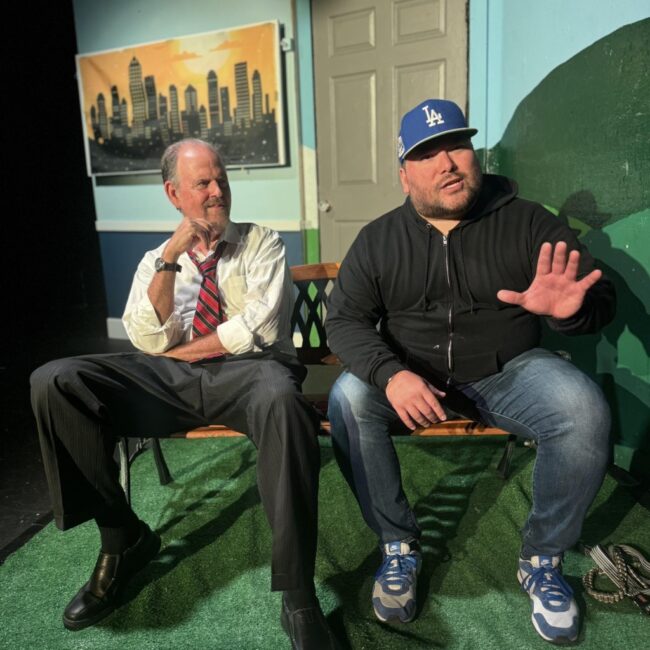
As the titular terrier, Jessie Duggan perfectly portrays all the essence of being a dog; constant movement and energy, overwhelming affection, and wearing her emotions on her sleeve. Duggan’s energy makes the audience instantly forget that they’re watching a person, and captures their attention immediately, making the animal lovers in the audience just want to pet her and offer her a treat. This action can be distracting at times, as Sylvia excitedly runs through the apartment making a mess of everything she encounters, though this may be by design. Duggan shows the humanity in the dog, giving the audience pause to think about what exactly Sylvia is trying to say with her various actions, while also reminding us with offstage leash yanks and tangling herself in the leash, that she still is a dog. Sylvia’s emotions frequently parallel human emotions regarding relationships, sex, and issues of morality. She struggles with her feelings toward her previous owner, and fears being sent to a kill shelter if she doesn’t fit well into Greg and Kate’s life, mirroring relationship struggles and breakups that humans frequently experience. She rails at a cat in the park, spewing obscenities and declaring her hatred for the other species. She resents Greg for considering giving her away to another family when things don’t go well, feeling betrayed. She even treats sex as “just a fling,” when Sylvia meets another dog in the park and gets a little too personal for Greg and Tom’s liking. Clearly, Duggan is a devoted dog owner, as she knows exactly how to show Syvia’s emotions and personality as seen through a human lens.
Sylvia’s new owner, Greg (Brian Binney) is a middle-aged man struggling to find his place in his own life. He’s tired of his work life, and finds new meaning in adopting Sylvia, much to the chagrin of his wife Kate. This creates a sort of “love triangle” between Greg, Kate, and the newly adopted Sylvia. Binney walks a thin line between dissatisfaction and madness, showing Greg as a man who sometimes loses his grip on reality in the struggle to redefine his own realities. As Greg begins to value his relationship with Sylvia more than that with his wife, he loses touch of Kate’s needs, making Kate’s accomplishments more about Sylvia than Kate, and fantasizing about Syvia having puppies, remembering the joys of raising his own children. Binney thoroughly renders Greg as a pitiable yet understandable man, caught between two relationships, as well as his own feelings toward himself. He also shows off his skills as a musician and singer, as he takes to the guitar while the cast performs a bittersweet rendition of “Every Time We Say Goodbye.”
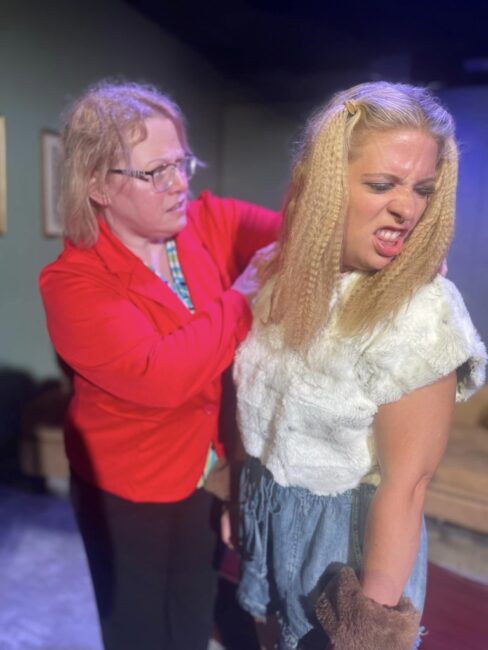
Sam David plays Kate, a snobby English teacher, and Greg’s wife of twenty-two years. From her introduction, Kate’s dry one-liners and all-business attitude make it clear to the audience that she disapproves of Greg’s new friend Sylvia, and is jealous of his newfound dedication to the dog. David’s Kate never gives an inch, demanding immediately that Greg get rid of Sylvia, and vowing to be rid of their new boarder by any means necessary, even threatening the dog’s life, and using her job as a ploy to push Sylvia out of Greg’s life. While she exhibits little growth as a character, David brings a reality to Kate that most of the audience might overlook: while some people may make sacrifices for the ones they love, this may not lead to a complete character overhaul. While Kate eventually learns to tolerate Sylvia, her attitude and demeanor never change, as is to be expected with some people. David’s Kate is a sobering reminder that not everyone is going to be as enthusiastic about their mate’s choices as one might expect.
Tom (Randy Lindsay), Greg’s acquaintance from the dog park, tends to overanalyze everything about dogs, leading to some creepy, almost sexual comments towards Sylvia and the other dogs. He’s the ideal foil for Greg, as a young man who fears women, and insists that they are just jealous of a man’s relationship with his dog. Lindsay brings a funny, obsessive swing to Tom, reminiscent of Jack Black. He’s quick to remind Greg with fervor that “Your dog is not a person,” but insists that Greg not spay Sylvia until she’s been in heat, to retain her femininity. This comment backfires later, when Sylvia has a tryst with Tom’s dog Bowser, who hasn’t been neutered, at Tom’s insistence that neutering changes a dog’s personality, but spaying doesn’t. Lindsay’s Tom ridicules the hypocrisy in some people’s views of gender, with strong, silly outbursts and inappropriate comments sure to make anyone offer uncomfortable giggles.
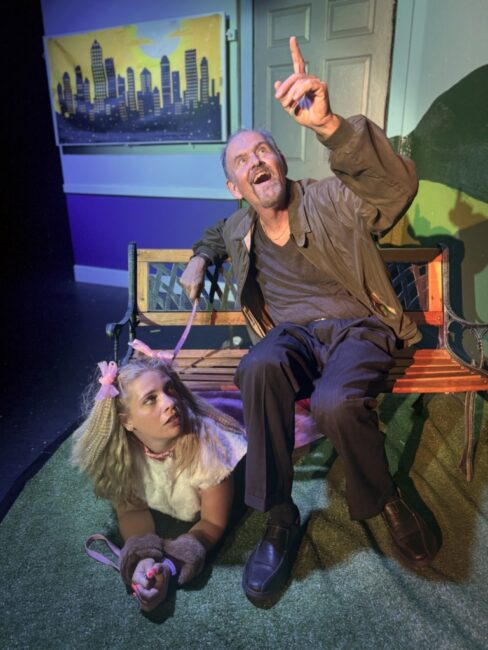
Phyllis (Dana Fleischer) is an old friend of Kate’s, who becomes a sounding board for Kate’s frustration toward Sylvia. She’s a snotty, patronizing woman who looks down on dog ownership, though has some poor traits of her own. Fleischer makes every second of her time as Phyllis memorable, punctuating Phyllis’ elitism with well-delivered Freudian slips. She creates in Phyllis that one friend that we all have that we wonder why we’re even friends with them, as they clearly look down on us. Phyllis’ deceitful alcoholism and outlandish reactions to Sylvia’s overenthusiastic welcome give levity to scenes involving Kate’s anger toward the dog, and Fleischer carries the hilarity with hysterical poise.
Rounding out the cast as Leslie, Kate’s friend and therapist, Amy Heller brings a darker, more medical truth to Greg’s obsession. She exudes professionalism as well as logical confusion as Greg uses his time with the therapist as a way to discuss his relationship with his dog rather than his wife, revealing to Greg that his devotion for Sylvia is only a subconscious need for a subservient woman rather than an equal in their relationship. Heller doesn’t flinch for a second as Leslie suggests divorce, as well as a bleak and violent solution to Kate’s issues with Sylvia. Heller grounds the otherwise laughable situation with a stance as serious as a heart attack.
Jovial yet thought-provoking, Sylvia reminds us all that relationships aren’t a one way street, and that everyone’s emotions are important, even if they aren’t allowed on the couch.
Running Time: Approximately 2 hours and 20 minutes with one intermission
Sylvia plays through September 22nd 2024 at Laurel Mill Playhouse— in the heart of historic Laurel at 508 Main Street in Laurel, MD. Tickets must be purchased in advance and are available by calling the box office at 301-617-9906 or through the ticketing website online.

